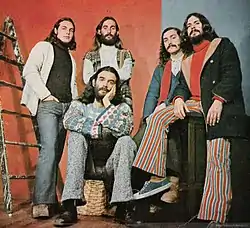Los Jaivas
Los Jaivas is a Chilean musical group who perform in folk, rock, psychedelic, and progressive rock styles formed in 1963 in Viña Del Mar, Chile. They are considered one of the most important and influential artists of all time in Latin America.
Los Jaivas | |
|---|---|
 Los Jaivas, August 15, 1972 | |
| Background information | |
| Origin | Viña del Mar, Chile |
| Genres | Folk, folk rock, avant-garde, progressive rock, Latin music, andean music, indigenous music |
| Years active | 1963–present |
| Associated acts | Violeta Parra, Pablo Neruda, Los Blops, El Polen, Arco Iris |
| Members | Juanita Parra Claudio Parra |
| Past members | Gabriel Parra † Eduardo "Gato" Alquinta † |
History
Los Jaivas appeared in Chilean music in 1963 as a progressive-rock-andino group, mixing rock with South American ancestral music. The Parra brothers met Mario Mutis and Eduardo "Gato" Alquinta (gato is the Spanish word for cat) in their childhood and joined to play music. They acquired fame in Viña del Mar, by playing at diverse parties and shows.
The band took refuge in Argentina after the military dictatorship took over in Chile. In 1977, they headed to France, where they resided for a long time. The first major change in the band occurred in 1988 when Gabriel died in Peru in a car crash. His daughter Juanita took his place behind the drums.
In January 2003, the main singer, Gato Alquinta, died in Coquimbo, Chile, of a heart attack while swimming in the sea. Gato's three sons soon joined the band to replace him: Ankatu (guitar), Eloy (saxophone) and Aurora (vocals). Aurora left shortly after, and Eloy died of a heart attack in 2004 . Ankatu, however, is still a member of the band.
Name
The original name of the band, proposed by Rolando Fuentes (a friend of founding member Claudio Parra during high school) was High-bass.[1] At that time in Chile, it was customary to use English names for musical bands. Another source indicates that the name is a reference to the members differences in height, since the word in Spanish for bass guitar is the same as that for short (bajo). Another source explains the name as a reference to the bass guitar played at a very high volume compared to the other instruments.
They quickly realized that an English-sounding name was not appropriate for a folk band, so they changed it to Jaivas (HIGH-BASS), a "Chileanized" pronunciation of "high bass" which ignores the fact that bass (the musical instrument) rhymes with base and lace in English, as opposed to the word bass (the fish) which rhymes with cass and lass, which is how the syllable vas is pronounced in the band's name. The spelling of Jaivas is a misspelling of the word jaibas, which means crabs in Spanish.[2]
Homage
A homage was made to Los Jaivas on the occasion of their 50th anniversary, at the Festival del Huaso de Olmué realised in Olmué, Chile, on 23–26 January 2014.[3]
Members
- Alan Reale (guitar, vocals)
- Juanita Parra (drums)
- Mario Mutis (vocals, electric guitar, bass, percussion)
- Claudio Parra (piano, vocals)
- Francisco Bosco (saxophone, organ)
- Carlos Cabezas (charango, vocals, violin, flute)
Former members
- Ankatu Alquinta (vocals, guitar)
- Gabriel Parra † (drums)
- Eduardo "Gato" Alquinta † (vocals, guitar)
- Eduardo Parra (organ, percussion)
- Eloy Alquinta † (vocals, saxophone, percussion)
- Aurora Alquinta (vocals)
- Carlos Edumuybueno (guitar)
- Julio Anderson (bass)
- Carlos Canzani (bass, guitar)
- Alberto Ledo (charango, quena)
- Marcelo Muñoz (drums)
- Fernando Flores (bass)
Discography
- El Volantín 1971
- Todos juntos 1972
- La Ventana 1973
- Palomita blanca (Movie soundtrack) 1973 (Released in 1995)
- Sueños de América 1974
- Los Jaivas (El indio) 1975
- Canción Del Sur 1977
- Mambo de Machaguay (Compilation) 1978
- Alturas de Macchu Picchu (based on lyrics from The Heights of Macchu Picchu by Pablo Neruda) 1981
- Aconcagua 1982
- Obras de Violeta Parra 1984
- Si tu no estás 1989
- Hijos de la Tierra 1995
- Trilogia: El Rencuentro 1997
- Mamalluca 1999
- En El Bar-Restaurant Lo Que Nunca Se Supo (Compilation) 2000
- Los Jaivas En Concierto: Gira Chile 2000 (Live) 2000
- Arrebol 2001
- Obras Cumbres (Compilation) 2003
- La Vorágine I, Pan Negro (Improvisations 1969-70) 2003
- La Vorágine II, La Reforma (Improvisations 1969-70) 2003
- La Vorágine III, El Tótem (Improvisations 1969-70) 2003
- La Vorágine IV, Mucha Intensidad (Improvisations 1969-70) 2003
- La Vorágine V, ¿Qué Hacer? (Improvisations 1969-70) 2003
- Serie de Oro: Grandes Exitos (Compilation) 2004
External links
References
- This version was told by Claudio Parra and Rolando Fuentes to the audience during a concert in November 4th, 2017 at Colegio Sagrado Corazón de Apoquindo, Santiago, Chile
- http://etimologias.dechile.net/?jaiba (in English)
- http://www.tvn.cl/especiales/olmue2014/artistas/los-jaivas-1043460